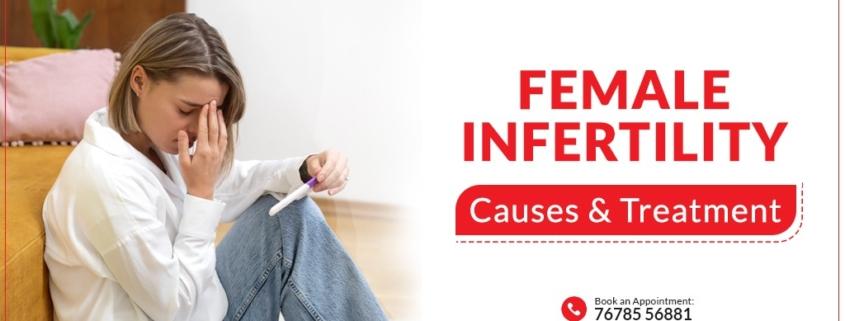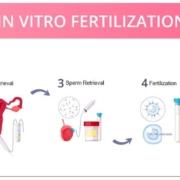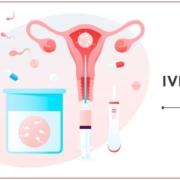Female Infertility: Symptoms, Cause, Diagnosis & Treatment
Female Infertility: Infertility is a medical condition in which a couple cannot get pregnant after having regular sexual intercourse without contraception for 12 months or more. For women above 35, infertility means being unable to conceive after having traditional intercourse for six months.
It can also be defined as the condition where a woman can conceive but either has repeated miscarriages or stillbirths. If infertility is due to the female partner, it is termed female infertility.
Scientifically, during unprotected intercourse, the sperm ejaculated by the fertile male partner swims through the uterus and reaches the egg for fertilization. But the sperm cannot do so because of some ovulatory dysfunction in the female. Or even if the sperm can fertilize the egg, the embryo so formed cannot get implanted in the uterus, which leads to a miscarriage.
Types of Infertility in Females
Female infertility has become a household term affecting 1 in every six women. Infertility in females, or infertility, in general, can be classified into two types:
- Primary infertility-: If a couple has never been able to conceive, or even if they have, they could not carry the pregnancy to term.
- Secondary infertility-: If a couple has at least one child but cannot conceive for a second time.
Female Infertility Causes
The female reproductive system is quite delicate. Even the slightest dysfunction in any part, namely the uterus, ovaries, or fallopian tube, can lead to issues in conceiving.
The root cause behind female infertility may or may not be detected accurately. The reports may appear normal, but you may still be unable to conceive. However, numerous factors have been witnessed to be the primary causes of female infertility causes which are stated below:
PCOS
PCOS is found to be one of the most common causes of female infertility as it disrupts menstruation and can lead to the formation of cysts which are around 8mm in size. These cysts produce eggs but cannot release them, so ovulation can not occur.
The ovaries regulate the production of estrogen and progesterone. However, sometimes the ovaries produce an excess of male hormone androgens. Polycystic Ovarian Syndrome or PCOS refers to a medical condition that leads to disruption of the menstrual cycle and shedding of the endometrium as a result of hormonal imbalance due to the production of the male hormone androgens.
Uterine Fibroids
Uterine fibroids are found in the form of growths or lumps and are caused due to the imbalance of reproductive hormones, namely estrogen and progesterone. The uterine fibroids can block or damage the fallopian tube, which may further lead to complications in conceiving. Around 20% of childbearing women have uterine fibroids.
Endometriosis
Endometriosis is a medical condition when the uterine lining starts to grow outside the uterine cavity, like the abdomen, pelvis, behind the uterus, or in the ovaries.
This condition can lead to infertility as it doesn’t allow the smooth transfer of eggs from the ovaries to the fallopian tube because of the growth of scars between the ovaries, fallopian tubes, and uterus.
Endometriosis may also lead to endometrial cysts and may prevent the fertilized egg from getting implanted in the uterine wall.
Blocked or Damaged Fallopian Tubes-:
Fallopian tubes are home to eggs. The sperm swims through the uterus and enters the fallopian tube. A blocked or damaged fallopian tube prevents the sperm from reaching the eggs and makes natural conception almost impossible.
Sexually transmitted infections, pelvic inflammatory disorders, pelvic surgery, and pelvic tuberculosis are some of the reasons that block or damage the fallopian tubes.
Around 20% of infertility issues stem from damaged or blocked fallopian tubes.
Hyperprolactinemia
Production of Prolactin hormone in large amounts is referred to as hyperprolactinemia which can result in infertility issues.
Ovarian Cysts
If ovarian cysts (a fluid-filled sac in or on the ovaries) are formed due to medical conditions like PCOS or endometriosis, it may pose problems in conceiving.
Premature Ovarian Failure
Premature ovarian failure refers to the early onset of menopause around or before the age of 40 or 45. It is bound to cause problems in conceiving naturally.
Hypothalamic Dysfunction
Hypothalamic dysfunction occurs when the hypothalamus cannot function optimally. When this happens, the hypothalamus cannot coordinate with the pituitary gland that regulates the timely release of healthy eggs for fertilization. The process of ovulation comes to a stop due to hypothalamic dysfunction.
Ectopic Pregnancy
During a normal pregnancy, the egg, after fertilization, is implanted in the endometrial lining. Ectopic pregnancy, also known as extra-uterine pregnancy, occurs when the embryo gets implanted somewhere else in the uterus. This medical condition may lead to miscarriages. Bleeding is often witnessed during an ectopic pregnancy.
Sexually Transmitted Infections-:
Sexually transmitted diseases can potentially prevent natural conception.
These infections can cause pelvic inflammatory disease (PID) and can also cause damage to the fallopian tubes. Both these conditions are directly linked to infertility in females.
- Uterine Abnormalities-: Uterine abnormalities can be the reason behind female infertility. Uterine abnormalities may result from the growth of scar tissues, fibroids, polyps, miscarriage, multiple abortions, infections, and the growth of benign tissues.
- Cancer-: Uterus cancer is the primary reason behind the development of tumours of varying sizes. These tumours are found to be one of the causes of female infertility.
- Other Hormonal Imbalances-: LH, FSH, and estrogen are the hormones responsible for the timely release of healthy eggs. However, the ovulation process gets disrupted if the eggs are released in the wrong amount and at the wrong time due to hormonal fluctuations.
- Unexplained infertility-: When the cause behind infertility can’t be ruled out during the infertility tests in females, this type of infertility is categorized under unexplained infertility.
Data shows that in as many as 10-30% of cases, the root cause behind female infertility can not be identified.
Risk Factors of Infertility in Females
Gynaecologists have drawn up a list of risk factors associated with infertility in females. The risk factors of female infertility include:
- Age (above 35)
- Drugs and steroids
- Excessive alcohol consumption
- Smoking
- Poor diet
- Heavy exercises
- Medications
- Chemotherapy and radiation treatment
- Eating disorders like anorexia, binge eating, bulimia
- Unhealthy lifestyle
- Stressful regime
- Poor Body Mass Index (being underweight or overweight)
Female Infertility Symptoms
Numerous symptoms back infertility in females you can keep an eye on before arriving at any conclusion. Female infertility symptoms include:
- Irregular and Abnormal Menstrual Cycle-: If you have irregular periods or your menstrual cycle lasts for more than seven days, it can be a symptom of infertility. A healthy menstrual cycle is of around 21 to 35 days. Reproductive issues may arise If it is less than 21 days or more than 35 days. The irregular menstruation cycle accounts for around 30-40% of cases of female infertility.
- Prolonged and Heavy Bleeding during Periods-: If you have heavy bleeding during periods that last for more than the normal range of 2-7 days, it can lead to fertility issues.
- Excruciating Pain during Periods-: Bearable pain for a day or two is common, but if your periods are accompanied by severe pain and cramps, it can be due to a reproductive health problem like endometriosis.
- Unexplained Weight Gain or Loss-: If you have lost or put on weight unexpectedly, you should get a medical checkup.
- Pain during Sexual Intercourse-: If you feel Intolerable pain constantly during sexual intercourse with your partner, it can point towards infertility.
- Hair Growth on Unwanted Areas-: If you witness hair growth on unwanted areas like the chest, jawline, and at your back, it may indicate PCOS or other medical problems linked to infertility.
- Hormonal Imbalances-: If the hormonal balance in the body is disrupted, it may affect fertility in females and can cause acne, reduced sex drive, and thinning of hair.
- No Periods-: Complete absence during childbearing age indicates something is wrong with your reproductive system.
If you observe such symptoms, you should visit a gynaecologist or IVF expert.
Infertility Tests for Females
Before treatment comes the identification of the root cause behind the reproductive ailment. We’ve already learned that female infertility can be caused by many factors that need to be identified. The fertility specialist carries out an array of infertility tests for females to determine the cause, which includes:
- Physical examination
- Urine test
- Pap smear
- Blood test
- Genetic testing
- Ultrasound scan
- Laparoscopy
- X-ray Hysterosalpingography (HSG)
- Hysteroscopy
- Saline sonohysterogram
Female Infertility Treatment
After the root cause behind infertility is identified, fertility specialists take other parameters like the woman’s age, personal preferences, and overall health status into account for choosing the right fertility treatment.
- Fertility drugs and medications-: Fertility drugs are prescribed to women to stimulate ovulation and regulate irregular ovulation cycle.
- Tubal surgeries-: Tubal abnormalities are corrected with tubal surgeries like laparoscopy. Laparoscopy helps treat blocked or damaged fallopian tubes by creating a new opening for the sperm to enter. This surgery also helps treat fibroids and abnormal uterine shapes and remove endometrial cysts.
- Assisted Reproductive Technology-: Assisted reproductive Technology like IVF, IUI, and ICSI have helped infertile women conceive and welcome a healthy baby.
Conclusion
Pregnancy is an age and time-dependent process. In today’s world, couples do not prefer having children at an early age which is why infertility is a common problem. So, planning a pregnancy can help you enormously if you want to increase your stakes of natural conception. If you notice any symptom that you think can be problematic, visit a gynaecologist. Also, ensure you maintain a healthy lifestyle to welcome a healthy baby.
And if you want to know more about ART treatment in Srinagar, we welcome you to the best fertility centre, Imprimis IVF.










